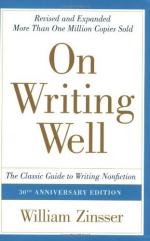
|
| Name: _________________________ | Period: ___________________ |
This test consists of 15 multiple choice questions and 5 short answer questions.
Multiple Choice Questions
1. How rigid are the lines between proper and improper English usage?
(a) They are very soft, and not rigid at all.
(b) There is a grey area, though the need for proper English is most important.
(c) There are no lines at all. Every writer has a poetic license to do with words what he or she pleases.
(d) They are very rigid and one cannot cross the line.
2. What do interviews do for the writer?
(a) They make a writer feel stupid since he or she does not know that much about a subject.
(b) They make a writer less valid, since he or she needs to interview several people to create one article.
(c) They make the writer an expert in a given subject.
(d) Interviews humanize a topic, making a boring topic interesting.
3. What is an example of a time when bad writing HAS to be read?
(a) Corporate memos or technical writing.
(b) In the newspaper.
(c) In English class.
(d) Online writing.
4. What is a common problem with nonfiction writers?
(a) They tend to write confusing articles that do not interest anyone.
(b) Nonfiction writers tend to want to say the last word on a subject, which covers too much ground.
(c) They want to be the final experts and turn away viable information that would change their articles.
(d) They don't research enough.
5. What is the main thing required to being a good writer?
(a) All answers are correct.
(b) Good editing.
(c) Passion.
(d) Hard work.
6. What is a dash useful for?
(a) Dashes are good in place of exclamations.
(b) Dashes act as pointers to a point and to set off parenthetical statementes.
(c) Dashes are good to connect complex sentences.
(d) Dashes are good to separate thoughts.
7. What are Zissner's feelings about writing?
(a) Writing is easy and anyone can do it.
(b) Writing can easily be taught.
(c) Writing is a craft that is developed over time.
(d) Writing is difficult, but with the right tools, anyone can do it.
8. What period of writing constantly used semicolons?
(a) Only 18th century England.
(b) The 19th century.
(c) The 17th century.
(d) All modern writing uses semicolons constantly.
9. How does Zinsser approach unusual words?
(a) He is very welcoming of a transforming English language.
(b) He is modern when it comes to English, but would rather keep it simple.
(c) He is very conservative and will never cross a proper word line.
(d) He accepts some, but not all.
10. What is the transaction in writing?
(a) The bookbuying process.
(b) How much facts a writer uses.
(c) How much a writer talks about themselves.
(d) How much a writer gives of themselves rather than of facts.
11. Why doesn't he simply cross out clutter?
(a) So that his students will learn to recognize clutter.
(b) Because underlining is easier on the eyes.
(c) Because it uses too much ink to cross out than to bracket.
(d) Because highlighting is easier to see.
12. What is Zissner's point of view on the debate between literature and journalism?
(a) He wants to go back to the pre-WWII form of writing.
(b) He agrees that journalism is bad writing.
(c) He agrees that literature is the only true form of good writing.
(d) He believes it doesn't matter, and that good writing is good writing.
13. What method of writing does Zissner use?
(a) Old Journalism.
(b) Cluster writing.
(c) Bold paragraph approach.
(d) New Journalism.
14. What makes a good first sentence?
(a) A good ending is best to tie up the first sentence.
(b) A good first sentence needs to be written with exceptional grammer.
(c) A good first sentence has a good lead. A good lead is one that works.
(d) The first sentence only sets up the second sentence. That is the one writers should focus on.
15. What group of people does the author think has the worst type of writing?
(a) Musicians.
(b) Politicians.
(c) Teachers.
(d) Toddlers.
Short Answer Questions
1. What is an alternative way of showing astonishment in writing?
2. What is the main attitude that writers have today?
3. When should a writer choose the point of view in a piece of writing?
4. Why does the doctor write?
5. What tense does Zissner recommend when starting a new piece?
|
This section contains 823 words (approx. 3 pages at 300 words per page) |

|




